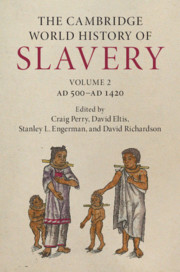Book contents
- The Cambridge World History of Slavery
- The Cambridge World History of Slavery
- The Cambridge World History of Slavery
- Copyright page
- Contents
- Figures
- Contributors
- Chapter 1 Slavery in the Medieval Millennium
- Part I Captivity and the Slave Trade
- Part II Race, Sex, and Everyday Life
- Part III East and South Asia
- Part IV The Islamic World
- Part V Africa, the Americas, and Europe
- Chapter 18 Slavery in the Carolingian Empire
- Chapter 19 Slavery in the Byzantine Empire
- Chapter 20 Slavery in Northern Europe (Scandinavia and Iceland) and the British Isles, 500–1420
- Chapter 21 Slavery in Medieval Iberia
- Chapter 22 Slavery in Africa c. 500–1500 CE: Archaeological and Historical Perspectives
- Chapter 23 Slavery in Precontact America
- Index
- References
Chapter 21 - Slavery in Medieval Iberia
from Part V - Africa, the Americas, and Europe
Published online by Cambridge University Press: 09 September 2021
- The Cambridge World History of Slavery
- The Cambridge World History of Slavery
- The Cambridge World History of Slavery
- Copyright page
- Contents
- Figures
- Contributors
- Chapter 1 Slavery in the Medieval Millennium
- Part I Captivity and the Slave Trade
- Part II Race, Sex, and Everyday Life
- Part III East and South Asia
- Part IV The Islamic World
- Part V Africa, the Americas, and Europe
- Chapter 18 Slavery in the Carolingian Empire
- Chapter 19 Slavery in the Byzantine Empire
- Chapter 20 Slavery in Northern Europe (Scandinavia and Iceland) and the British Isles, 500–1420
- Chapter 21 Slavery in Medieval Iberia
- Chapter 22 Slavery in Africa c. 500–1500 CE: Archaeological and Historical Perspectives
- Chapter 23 Slavery in Precontact America
- Index
- References
Summary
This chapter provides an overview of slavery as practiced in the Iberian Peninsula over the course of the medieval period, from the era of the Visigoths up until the era of the Catholic Kings, and in both Muslim and Christian-controlled territories. While traditionally scholars have paid attention to medieval Iberian slavery almost exclusively for the purposes of exploring how it laid the groundwork for the Atlantic-World slave system, this chapter argues that the study of slavery in this particular time and place merits scholarly interest for a wealth of other reasons, in particular, it illuminates how gender and the law had a profound impact on both the experiences and trajectories of the enslaved.
Keywords
- Type
- Chapter
- Information
- The Cambridge World History of Slavery , pp. 508 - 530Publisher: Cambridge University PressPrint publication year: 2021
References
A Guide to Further Reading
- 1
- Cited by

